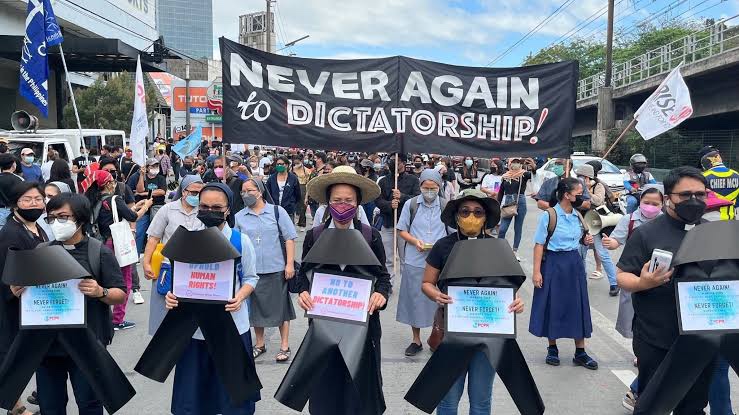Philippine protesters assert ‘never again’ on anniversary of anti-Marcos uprising

In a poignant commemoration of the uprising that ousted Ferdinand Marcos, hundreds of Filipino protesters took to the streets of Manila on Sunday. The rally, held on the anniversary of the historic event, served as a resolute declaration to prevent his son from replicating the autocratic reign of the past.
The ascension of Marcos Jr to the presidency in 2022, marking a significant political resurgence for the Marcos family, has reignited concerns among activists and citizens alike. The specter of a return to authoritarian rule looms large, particularly amidst divisive efforts to amend the 1987 constitution—a move critics fear could erode democratic safeguards, notably term limits restricting presidents to a single six-year term.
Economist Rosario Guzman, a participant in the 1986 uprising, encapsulated the sentiment driving the protest, emphasizing rejection of Marcos’s charter change initiative perceived as a bid to perpetuate power. Banners emblazoned with “No to Cha-Cha” underscored the demonstrators’ stance, juxtaposed with a symbolic black coffin representing the perceived erosion of freedom and democracy.
While Marcos Jr contends that constitutional amendments primarily target economic provisions to spur foreign investment and job creation, skepticism abounds regarding the timing and broader implications. The modest turnout at the march, juxtaposed against the monumental gatherings of 1986, underscores evolving dynamics in Philippine politics, albeit against a backdrop of lingering apprehension.
The legacy of Marcos Sr’s repressive regime looms large over contemporary discourse, with human rights organizations decrying widespread abuses and corruption that scarred the nation. For many, the anniversary march serves as a stark reminder of the perils of authoritarianism, with 21-year-old protester Giu de Sagun lamenting the sense of historical recurrence.
As the nation grapples with the echoes of its past, a parallel narrative unfolds within the political landscape. Despite accolades for steering away from Duterte’s controversial drug war, Marcos Jr’s administration faces scrutiny over its commitment to democratic principles. The release of prominent rights advocate Leila de Lima underscores the delicate balance between accountability and transition, as the Philippines navigates a complex trajectory of political evolution.
Amidst the solemn ceremonies and fervent protests, the message remains clear: the Filipino people, buoyed by the spirit of resistance that defined the People Power movement, stand resolute in their determination to safeguard democracy and ensure that the shadows of the past remain firmly behind.
